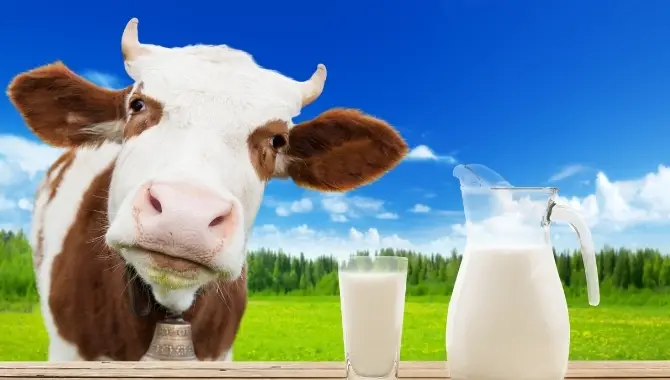Skim milk is a popular low-fat version of regular milk. Milk, in general, is considered a staple in many people’s diets and this version can be consumed as a beverage, added to smoothies, poured on cereal, and even used as an additive in processed foods.
The main benefit of skim milk is it supplies a high amount of calcium, vitamin D, and protein at a relatively low amount of calorie. As a result, many people rely on it for health and weight management purposes.
For newcomers in the vegan world wondering if they should include skim milk in their new diet, given its many benefits, you have come to the right place for answers.
Is skim milk vegan? No! That’s because skim milk is just regular milk from cows that has undergone the process of skimming to remove fat. A vegan diet excludes animal products and by-products, and even foods that have been processed using animal products. And, skim milk is evidently an animal by-product.
Veganism isn’t a fully defines lifestyle as several variants come into play. Traditional vegans are fully concerned with abstaining from the use of animal products for ethical and environmental purposes while others are focused on health benefits.
In this text, I’ll take a dipper look at why skim milk is non-vegan and the best vegan alternatives for it that offer the same nutritional benefits and that you can use for the same purposes without compromising your beliefs. Without further ado, let’s get right into it:
Why Is Skim Milk Non-Vegan?
There are many interrelated reasons why skim milk is a no-no for vegans. On one hand, the answer is as simple as it’s derived from animals. On another level, veganism goes beyond food choices to include reasons related to health, ethical, and environmental issues. Skim milk ticks all these boxes as explained below:
Ethical concerns
Dairy farming is essentially systematic cruelty as animals are treated as mere machines. To continuously produce milk, these animals live in a permanent state of pregnancy through artificial insemination. They are then separated from their calves almost immediately after birth, causing huge distress to both the mother and the calves. The male calves are often slaughtered within a few months for veal production while the female calves are primed for a life as a dairy animal.
The dairy animals develop frequent infections from constant milking, which is usually done mechanically 1-3 times a day. While a cow can live for up to 25 years, dairy cows are usually slaughtered after 5-7 years when their milk yield has decreased.
Throughout the entire process, the dairy animals are forced to live in confined spaces on hard and uncomfortable concrete surfaces and some never get to see the light of day.
When faced with the cruelty of the dairy production industry, it’s hard to see any form of milk, skim milk included, as anything but non-vegan.
Environmental concerns
Animal farming, in general, has a vast environmental footprint. The increasing demand for skim milk and other dairy products is taking a toll on natural resources like land, soil, air, and water.
With millions of dairy cows worldwide, these animals and their manure produce huge amounts of methane, which is one of the most potent greenhouse gases that contribute to climate change. The manure can also be problematic when mishandled or even applied as fertiliser. It can run off into local water resources, thus damaging essential ecosystems and even producing toxins that are harmful to drinking water.
On top of that, dairy farming requires huge amounts of land for keeping the animals and growing animal feed. This contributes to the loss of ecologically important areas like forests, prairies, and wetlands.
Issues related to health
For those adopting a vegan lifestyle for health purposes, dairy isn’t exactly healthy food. First off, milk is one of the most common food allergens with symptoms ranging from mild to severe, including vomiting, wheezing, digestive problems, and even a life-threatening reaction called anaphylaxis. Animal proteins, in general, are also thought to be potentially carcinogenic.
Secondly, skim milk may be less on saturated fat but it doesn’t contain enough nutrients. Vitamin A and D are fat-soluble and are, therefore, removed significantly during the skimming process. This makes fortification of skim milk mandatory.
There’s an increasing demand for skim milk and dairy products at large, which in turn increases dairy farming. From this text, it’s evident that reducing or completely stopping skim milk consumption will lower the demand for dairy production and, thereafter, offer all the benefits I have discussed above. People can get all the calcium they need from other food sources like vegetables.
Is There Skim Milk In Vegan Foods?
As mentioned earlier, skim milk is also used as a food additive to enhance the nutritional value, taste, and texture of certain processed foods. Therefore, while it’s easier to avoid it as a beverage, it might be lurking in otherwise vegan foods. This is why it’s very important to check the ingredients label of every processed food before buying to ensure it’s entirely vegan-friendly.
With that being said, here are some common foods that include skim milk as an ingredient:
Imitation cheese
This kind of cheese is common in many vegan recipes and usually described as a non-dairy, plant-based product. While this is true for the most part, manufacturers tend to include casein –a major protein found in milk. These proteins can be extracted from skim milk through acidification or enzyme precipitation or they just add the skim milk directly to the product.
Margarine
This product was, in the past, made from animal fat but it has since moved to include mostly non-hydrogenated oil, water, and emulsifiers. Margarine has become a common non-dairy substitute for butter but softer, tasty ones still include cultured skim milk.
Low-fat foods
The fat content in food products determine how they turn out as it improves the flavour and provides a nice smooth texture. For this reason, low-fat foods tend to include dairy products like skim milk, emulsifiers, and stabilisers to add a soft palatable texture and improve their flavour.
Vegan Alternatives to Skim Milk
The selection of non-dairy milk options has exploded in recent years, providing solutions to vegans who still want or need to consume milk. Since skim milk contains about 0.1% of fat, a good vegan replacement would be one that is also low in fat while offering a pleasant or neutral taste. Luckily, there are plenty of plant-based options that fit this criterion, including:
- Almond milk: This is made using whole almonds/almond butter with water. Almond milk is one of the lowest-calorie non-dairy milk available and a natural source of vitamin E but it does lack protein.
- Soy milk: Made using soybeans or soy protein isolate with thickeners and vegetable oils to improve consistency and taste. Soy milk is high in protein but has a higher fat content compared to almond milk.
- Coconut milk: Made from the white flesh of brown coconuts and water. Coconut milk contains half the fat of cow’s milk, a third of the calories, and significantly fewer carbs and proteins.
- Oat milk: This is simply a mixture of oats and water although manufacturers add salt, oils, and gums to produce a smooth texture and a desirable taste. Oat milk contains the same amount of calories as cow milk but half the amount of proteins and fat, and double the number of carbs.
Other popular choices include rice milk, flax milk, cashew milk, macadamia milk, and hemp milk among others. Overall, they are all quite tasty and can be used to make all the classical beverages that contain skim milk.
What to Consider When Substituting
With such a wide range of plant-based milk, it can be challenging choosing the best option. Here are a few things to keep in mind when shopping for vegan alternatives to skim milk to help you make the best possible choice:
Dietary needs
Different plant-based milks offer different nutrients at different levels; therefore, go for what fits your nutritional needs. That said, calcium is the major nutritional value of cow milk and it’s essential for healthy bones and preventing osteoporosis. Vitamin B12, on the other hand, is naturally found in animal products and is vital for a strong immune system and healthy brain. Luckily, plant-based milks are fortified with them. Consider one with at least 120 mg of calcium per 100 ml and fortified with vitamin B12.
Ingredients and additives
Some people have intolerances or are allergic to certain ingredients used in plant-based milk like nuts, soy, and gluten, or perhaps you just prefer to avoid additives like carrageenan and vegetable gums. Sugar is another common ingredient added to plant-based milk to add texture and flavour and we all know how controversial it is in the vegan world. Consider unsweetened options and generally check the labels to know exactly what is in your milk.
Cost
Plant-based milk tends to cost more than skim milk, so go for one within your budget. Alternatively, you can try making them at home.
Welcome to VeganClue - My name is Robert Van De Ville and together with my team we spent hundreds of hours researching the most relevant topics for Vegans and non yet Vegans. Are you looking for more information about Veganism, animal welfare, diet, health, and environmental benefits of the Vegan lifestyle? You are in the right place! Enjoy the site.

